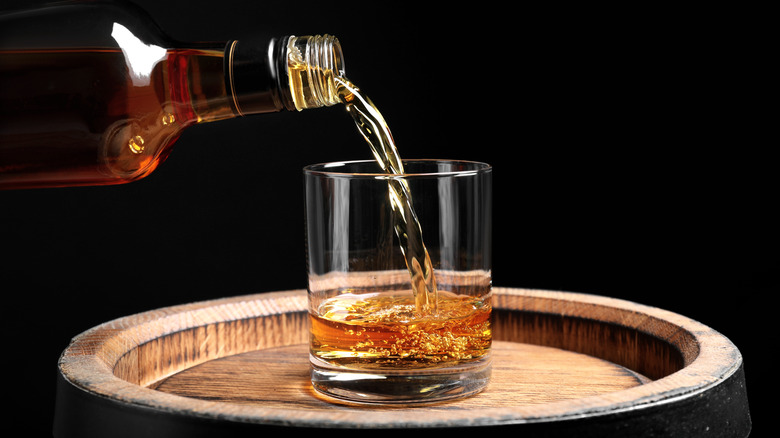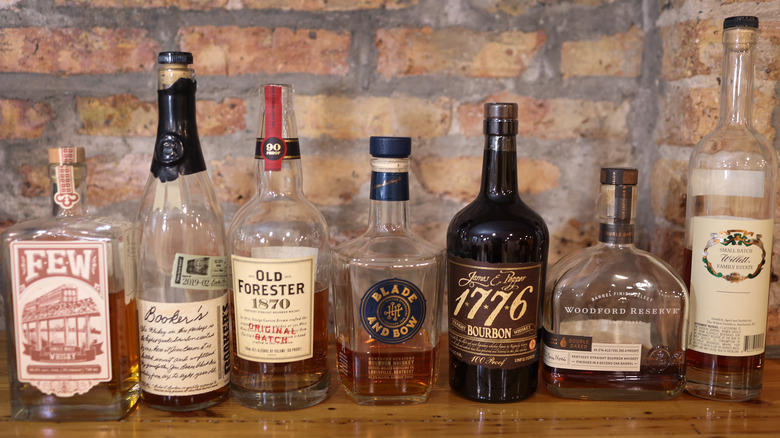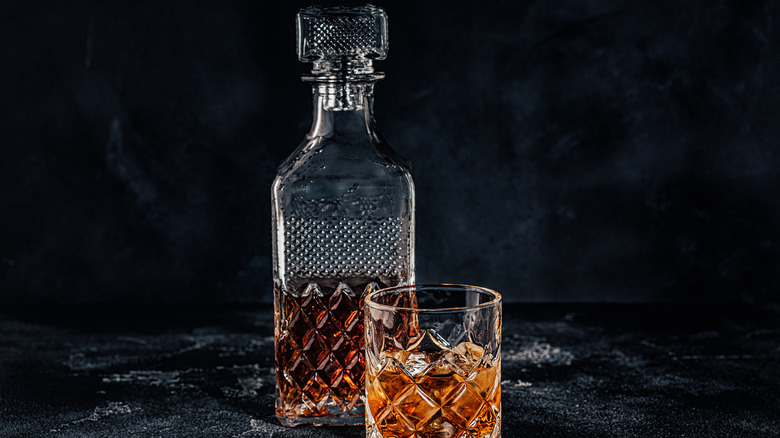How Long You Have To Drink An Open Whiskey Bottle For The Best Flavor
Remember that celebratory bottle of good whiskey you bought for a promotion or party, tried once, and then put back on the bar cart for months? Well, we've got some bad news for you. You might be under the impression that an open bottle of whiskey has an indefinite shelf life — after all, it is a fairly strong liquor that is intentionally aged for a long time — but that's not exactly true. Its longevity is certainly better than the shelf life of champagne and other wines, as well as some more delicate spirits, but whiskey does not last forever.
Most wines, aperitifs, and spirits are meant to be consumed within a relatively short amount of time after opening. It's why we refrigerate open bottles of wine or vermouth. And while you don't necessarily want to go popping that bottle of Pappy Van Winkle in the fridge, lest you ruin the flavor, you do need to pay attention to how long it's been opened if you want to use it up before the quality deteriorates. To stay on the safe side, an open whiskey bottle should be consumed within three to six months of opening, though there are other factors to consider that may influence your particular bottle.
What happens if whiskey is left out for too long?
Whiskey bottles are tightly sealed for a number of reasons: To prevent tampering, avoid leaking, and protect the bottles during transportation. But one of the biggest reasons besides these is to prevent oxidization. The moment whiskey is opened and meets air, a chemical reaction will begin to take place due to oxygen exposure. Over time, as it's exposed to more and more oxygen, your whiskey will take on unpleasant flavors described as earthy, or even like graphite. It won't be as noticeable of a flavor shift as a wine that has turned or a beer that has skunked, but it does have an impact. You'll definitely have to avoid adding off flavors to those really nice bottles you want to enjoy for a while, after spending a ton on them.
To prevent oxidization in opened bottles of whiskey, consider decanting your whiskey into a smaller bottle, decreasing the amount of air it's exposed to inside he container. If you want, you can also purchase a fashionable decanter to store your whiskey in — just make sure it has an airtight stopper. Snap-top bottles used for home-brewing beer or kombucha are also a great option. These bottles are meant to preserve fermented liquids, so they work great for any kind of alcohol.
Tips for storing whiskey
If you really want to get the most out of your whiskey, plan on drinking the whole bottle within a couple months of opening. If this is a big task for you, you could also buy smaller bottles to increase your overall turnover time. It may be a lesser value on paper, but if you can't drink a big bottle and it ends up going to waste, you're going to lose even more money.
It's also essential to store your whiskey like a true connoisseur by keeping it in a cool, dry place away from sunlight. You don't necessarily need a dedicated whiskey cave, but it will fare better in a kitchen cabinet than an open-air bar cart. Keep it away from your fridge, oven, dishwasher, and other devices that produce heat. You also want to make sure you're storing your whiskey upright, not horizontally, as you would do with wine. In wine, it's beneficial to keep the cork wet pretty much all the time, but the cork in a whiskey bottle can disintegrate over time, which you definitely don't want. Just give the bottle a tip a couple times a year to keep the cork moist. Though hopefully, it won't be sitting around for quite that long.



